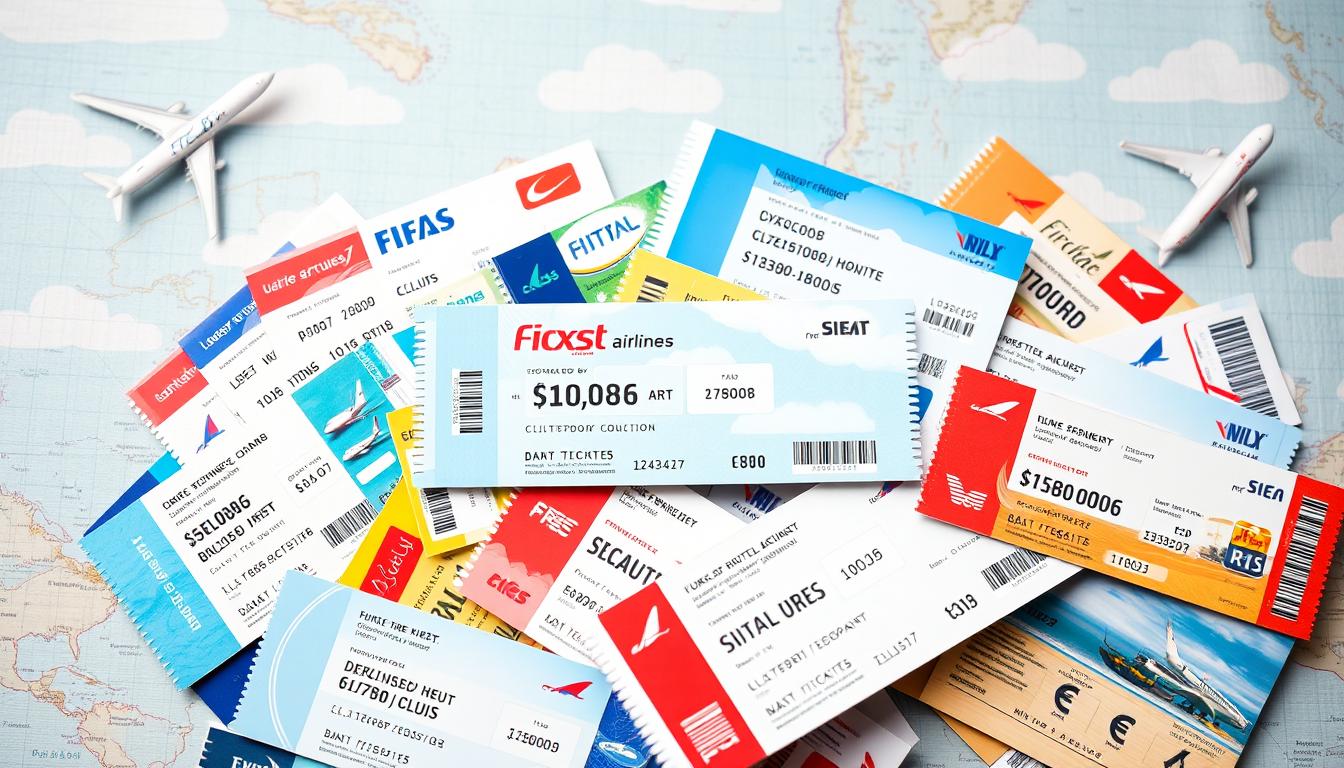Navigating the world of air travel can be a daunting task, but with the right strategies, you can unlock a treasure trove of affordable airline tickets and secure the best flight deals. Whether you’re planning a long-awaited vacation or a crucial business trip, the ability to find cheap airline tickets can make all the difference in your travel budget.
In this comprehensive guide, we’ll explore the ins and outs of the airline ticket landscape, equipping you with the knowledge and tools to become a savvy air traveler. From understanding the various types of airline tickets to uncovering the factors that influence flight prices, you’ll be empowered to make informed decisions and maximize your savings.
So, whether you’re a seasoned jet-setter or a first-time flyer, get ready to embark on a journey that will not only take you to your desired destination but also leave you with more money in your pocket. Let’s dive in and uncover the secrets to finding cheap airline tickets and securing the best flight deals today!
Understanding Airline Tickets
Navigating the world of airline tickets can be a daunting task, especially for those new to air travel. However, understanding the basics of airline tickets can empower you to make informed decisions and secure the best ticket prices for your upcoming journeys.
What Are Airline Tickets?
Airline tickets are the primary documentation required for air travel. These tickets serve as a contract between the passenger and the airline, outlining the terms and conditions of the transportation service. Whether you’re booking airline fares for a domestic or international flight, understanding the different types of airline tickets can help you navigate the booking process with ease.
Types of Airline Tickets
Airline tickets come in a variety of forms, each with its own set of features and benefits. Some common types of airline tickets include:
- Refundable Tickets – These tickets allow for greater flexibility, as they can be canceled or changed with the potential of a full or partial refund.
- Non-Refundable Tickets – These tickets are generally less expensive, but they come with limited flexibility and often do not allow for refunds or changes.
- Electronic Tickets – Also known as e-tickets, these are the most common form of airline tickets today, stored electronically with the airline.
- Paper Tickets – Though less common in modern air travel, some airlines still offer physical paper tickets for select bookings.
Understanding the differences between these ticket types can help you make the best choice for your travel needs and budget.
Factors Affecting Flight Prices
When it comes to finding the best deals on airline fares and ticket prices, understanding the key factors that influence flight pricing can be incredibly useful. This section delves into the seasonal trends, day of the week, and timing of booking that can impact the cost of your next trip.
Seasonal Trends
Airline ticket prices are heavily influenced by seasonal demand. Prices tend to be higher during peak travel seasons, such as summer and holidays, when more people are seeking to fly. Conversely, you can often find lower airline fares during shoulder seasons or off-peak times of the year, like early spring or late fall.
Day of the Week
The day of the week you choose to book your flight can also impact ticket prices. Typically, flights booked on weekends, particularly Sundays, tend to be more expensive than those booked on weekdays. This is because weekend travel is more in demand, so airlines can charge a premium.
Time of Booking
The timing of when you book your flight can make a significant difference in the price you pay. As a general rule, booking your tickets well in advance, such as 4-6 months before your travel dates, can result in the best airline fares. However, being flexible with your travel dates and monitoring for last-minute deals can also yield great savings.
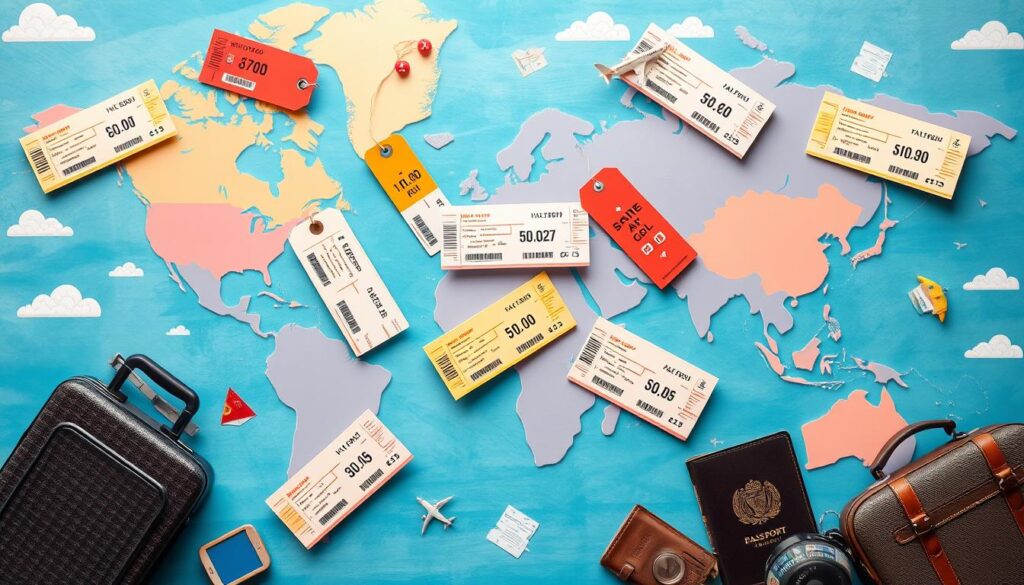
By understanding these key factors, you can make more informed decisions and find the most cost-effective ticket prices for your next trip. Keeping an eye on seasonal trends, booking on the right days, and timing your reservations can all contribute to significant savings on your airline tickets.
Best Strategies for Finding Cheap Airline Tickets
Booking airline tickets can be a daunting task, but with the right strategies, you can find incredible online booking deals and travel deals. Let’s explore some of the best approaches to securing affordable flights for your next adventure.
Use Flight Comparison Websites
One of the most effective ways to find cheap airline tickets is by utilizing flight comparison websites. These platforms, such as Google Flights and Skyscanner, allow you to search across multiple airlines and dates, providing a comprehensive view of pricing options. By comparing prices, you can identify the most budget-friendly routes and make an informed decision.
Set Fare Alerts
Setting up fare alerts is another valuable strategy for scoring online booking deals. Many airlines and travel websites offer the ability to receive notifications when prices for your desired route drop, enabling you to pounce on the best travel deals.
Be Flexible with Dates
Flexibility is key when it comes to finding cheap airline tickets. Consider adjusting your travel dates by a day or two, as this can result in significant cost savings. Additionally, being open to flying on off-peak days, such as Tuesdays or Wednesdays, can also help you secure more affordable fares.
By employing these strategies, you’ll be well on your way to securing the best possible online booking deals and travel deals for your upcoming flights. Happy travels!
The Role of Budget Airlines
In the ever-evolving airline industry, budget airlines have carved out a significant niche, revolutionizing the way people approach airline tickets and flight reservations. These low-cost carriers offer a cost-effective alternative to traditional legacy airlines, making air travel more accessible to a wider range of travelers.
Advantages of Budget Airlines
Budget airlines prioritize efficiency and affordability, providing passengers with several key advantages. These include:
- Competitive Pricing: By stripping down amenities and focusing on bare-bones fares, budget airlines can offer significantly lower ticket prices than their full-service counterparts.
- Flexibility: Many budget airlines allow for greater flexibility in flight schedules and booking options, enabling travelers to tailor their journey to their specific needs.
- Accessibility: Budget airlines have expanded air travel to previously underserved markets, making it more convenient for individuals to explore new destinations.
Popular Budget Airlines to Consider
When searching for airline tickets or making flight reservations, travelers should consider some of the leading budget airlines in the market. These include:
- Southwest Airlines
- JetBlue Airways
- Spirit Airlines
- Frontier Airlines
- Allegiant Air
Each of these budget airlines offers a unique set of benefits and considerations, so it’s crucial for travelers to research and compare options to find the best fit for their preferences and budget.

Navigating Major Airlines
When it comes to booking airline tickets, the major legacy carriers are a crucial consideration. These established airlines often offer a wide range of services and amenities, but understanding what to expect can help travelers make informed decisions and potentially find the best airline fares.
What to Expect from Legacy Carriers
Legacy airlines are known for their extensive route networks, frequent flyer programs, and premium in-flight services. Travelers can typically expect a more structured and traditional flying experience, with options for first-class, business-class, and economy-class seating. These airlines often provide complimentary meals, checked baggage, and on-board entertainment, catering to a range of passenger needs.
Comparing Services and Fees
While legacy carriers offer a comprehensive service, they may also come with higher airline fares and additional fees. Baggage fees, seat selection charges, and costs for in-flight amenities can add up quickly. Travelers should carefully review the services and fees of different airlines to find the best value and align with their specific travel needs and preferences.
By understanding the offerings and fee structures of major airlines, travelers can navigate the airline industry with confidence, ultimately securing the most suitable airline fares and flight options for their journey.
The Importance of Timing
When it comes to air travel booking, timing is everything. The optimal time to purchase air travel tickets can significantly impact the ticket prices you end up paying. Understanding the trends and best practices for booking domestic and international flights can help you secure the best deals and maximize your travel budget.
When to Book for Domestic Flights
For domestic air travel booking, the sweet spot for finding the most affordable fares is typically 4-6 weeks before your desired travel date. This timeframe allows you to take advantage of early booking discounts while avoiding the last-minute price surges that often occur closer to the travel date.
When to Book for International Flights
Planning an international trip requires a bit more foresight. The optimal booking window for international flights is generally 3-6 months in advance. This extended lead time gives you the best chance of securing the lowest ticket prices and securing your preferred flight options.
By understanding the importance of timing in air travel booking, you can make informed decisions and enjoy significant savings on your next trip, whether it’s a domestic or international adventure.
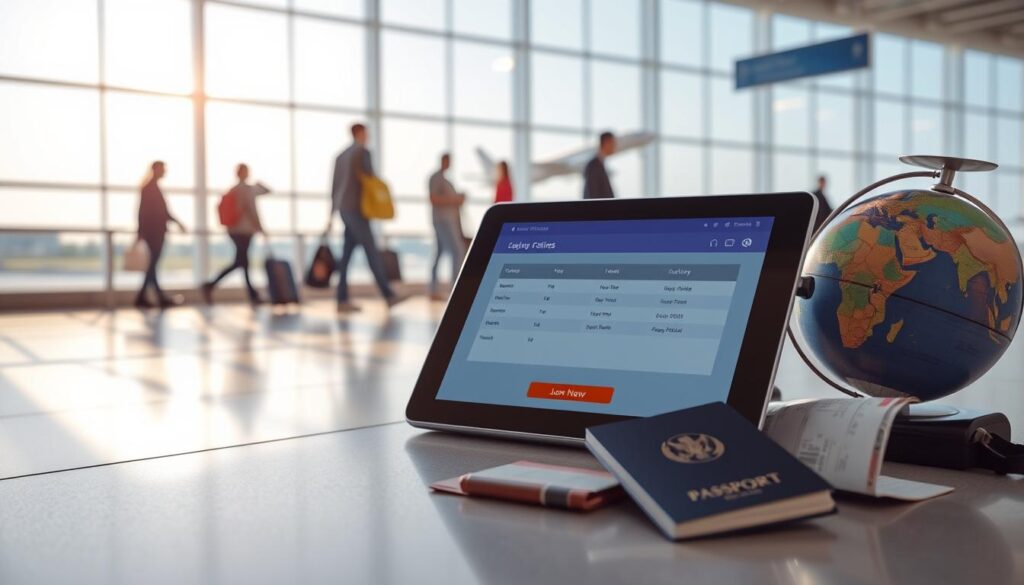
Utilizing Travel Rewards Programs
Savvy travelers understand the immense value of tapping into travel rewards programs. These loyalty programs offer a wealth of opportunities to earn points and redeem them for flights, making your next adventure more affordable. Let’s explore how you can maximize the benefits of these programs and secure excellent travel deals.
How to Earn Points
Earning points in travel rewards programs is easier than you might think. Here are some effective strategies to accumulate points:
- Sign up for frequent flyer programs with your preferred airlines and hotel chains.
- Use a credit card that offers bonus points for purchases related to travel, such as flights, hotels, and dining.
- Take advantage of special promotions and bonuses offered by the programs.
- Participate in surveys, surveys, and other activities that allow you to earn additional points.
Redeeming Points for Flights
Once you’ve built up a substantial number of points, it’s time to put them to good use. Redeeming your points for flights can be an excellent way to save on airfare and enjoy frequent flyer programs and travel deals. Here are some tips to make the most of your points:
- Research the various redemption options offered by your rewards programs.
- Compare the value of your points across different flight options to ensure you’re getting the best deal.
- Be flexible with your travel dates and times to maximize the value of your points.
- Consider booking awards flights well in advance to secure the best availability.
By leveraging the power of travel rewards programs, you can unlock the door to more affordable and rewarding air travel experiences. With the right strategies, you can earn and redeem points effectively, making your dream destinations more accessible than ever before.
Tips for First-Time Flyers
Embarking on your first airline journey can be an exciting yet daunting experience. From understanding airline policies to packing efficiently, this section offers valuable insights to help ensure a smooth and hassle-free travel experience for novice flyers.
Understanding Airline Policies
Before your trip, it’s essential to familiarize yourself with the policies and regulations of your chosen airline. This includes researching baggage allowances, carry-on restrictions, and any additional fees that may apply. By being informed, you can avoid unpleasant surprises and ensure a stress-free journey from start to finish.
Another important aspect to consider is the airline’s check-in and boarding procedures. Arrive at the airport with ample time to navigate the process, as this can vary significantly between carriers. Utilizing airline mobile apps can also streamline the check-in experience and provide valuable information about your flight.
What to Pack for Your Journey
Packing efficiently is key for first-time flyers. Start by making a comprehensive list of essential items, such as your passport, identification, and any necessary medications. Consider the airline tickets and flight reservations you’ve booked, as well as the duration and destination of your trip, to determine the appropriate clothing and personal items to bring.
- Pack only the necessities to avoid excess baggage fees and simplify the security screening process.
- Invest in a durable and lightweight carry-on bag to maximize space and ease of movement through the airport.
- Remember to pack any valuables, important documents, and a change of clothes in your carry-on, just in case your checked luggage is delayed.
By following these tips, first-time flyers can feel more confident and prepared for their upcoming journey, ensuring a seamless and enjoyable travel experience.
Common Mistakes to Avoid When Booking
As you navigate the world of online booking for airline tickets, it’s crucial to steer clear of common pitfalls that can cost you dearly. Two of the most prevalent mistakes travelers often make are last-minute bookings and failing to explore alternative airport options.
Last-Minute Bookings
While the thrill of spontaneity can be alluring, last-minute ticket prices are typically astronomical. Booking your flights well in advance, ideally several weeks or even months before your travel dates, can unlock significant savings. By planning ahead, you’ll have a better chance of securing the most affordable fares and the widest selection of flight options.
Not Checking Alternative Airports
Often, travelers make the mistake of solely focusing on their preferred departure and arrival airports, without considering nearby alternatives. However, exploring alternative airports can uncover substantial cost savings. Be flexible with your travel plans and compare prices across multiple airports to find the best deals.
- Consider flying in or out of smaller regional airports, which may offer lower fares than major hubs.
- Look into airports located in neighboring cities or states, as they may provide more affordable options.
- Utilize flight comparison websites to easily scan multiple airport options and identify the most cost-effective routes.
By avoiding these common booking mistakes, you’ll be well on your way to securing the best ticket prices and maximizing your travel budget. Stay vigilant, plan ahead, and be open to alternative airport options to unlock the most rewarding flight deals.
How to Use Incognito Mode in Browsers
When it comes to online booking for airline fares, using incognito mode in your browser can make a significant difference. This lesser-known feature can help you uncover potential savings and better deals on your flight tickets.
Why It Matters for Pricing
Airlines and travel websites often use cookies and browsing history to dynamically adjust prices based on an individual’s search patterns. By using incognito mode, you can prevent these websites from tracking your previous searches and potentially inflating the prices. This can lead to more transparent and potentially lower fares.
Steps to Search Effectively
- Open your browser and select the incognito or private browsing mode, depending on the browser you’re using.
- Head to your favorite online booking platform and search for your desired flight dates and destinations.
- Compare the prices you see in incognito mode with the prices you would see in a regular browser window. This can help you identify any discrepancies and potential savings.
- If you notice a significant price difference, consider booking your airline fares in incognito mode to maximize your savings.
Remember, while incognito mode can be a valuable tool, it’s not a guarantee of finding the cheapest flights. Airlines and travel websites continuously update their pricing algorithms, so it’s always important to compare prices across multiple sources and platforms.

Hidden Fees and Charges
Navigating the world of airline tickets can be challenging, especially when it comes to hidden fees and charges. These additional costs can quickly add up, making it essential for travelers to understand them thoroughly before booking their flights.
Baggage Fees
One of the most common hidden fees in the airline industry is baggage fees. Many airlines now charge for checked bags, and the prices can vary significantly depending on the airline and the size and weight of the luggage. Travelers should familiarize themselves with the baggage policies of their preferred airlines to avoid unexpected charges at the airport.
Extra Service Costs
In addition to baggage fees, airlines may also charge for various extra services, such as seat selection, in-flight meals, and priority boarding. These fees can add up quickly, so it’s crucial for travelers to carefully review the airline’s website or speak with a customer service representative to understand the full cost of their airline fares.
By being aware of these hidden fees and charges, travelers can better plan their budgets and make more informed decisions when booking their flights. Understanding the true cost of a ticket, including any additional fees, can help ensure a smooth and stress-free travel experience.
Overcoming Travel Restrictions
As travel resumes and air travel booking becomes more accessible, navigating the ever-changing landscape of travel restrictions is crucial. Understanding visa requirements and adhering to health and safety guidelines are essential steps to ensure a seamless flight reservation experience.
Understanding Visa Requirements
Visa requirements can vary significantly depending on your destination and nationality. It’s imperative to research the specific visa policies for your chosen travel location well in advance. Some countries may require a valid visa, while others offer visa-free entry or e-visas. Familiarize yourself with the necessary documentation and application processes to avoid any delays or complications during your air travel booking.
Health and Safety Guidelines
In the wake of the COVID-19 pandemic, many destinations have implemented stringent health and safety protocols for international travelers. These may include requirements such as proof of vaccination, negative COVID-19 tests, or mandatory quarantine periods. Staying up-to-date with the latest regulations and being prepared to comply with these guidelines can make a significant difference in ensuring a smooth and hassle-free journey.
By understanding visa requirements and adhering to health and safety guidelines, travelers can overcome the challenges posed by travel restrictions and enjoy a seamless flight reservation experience. Staying informed and proactive in your preparations is the key to air travel booking success.
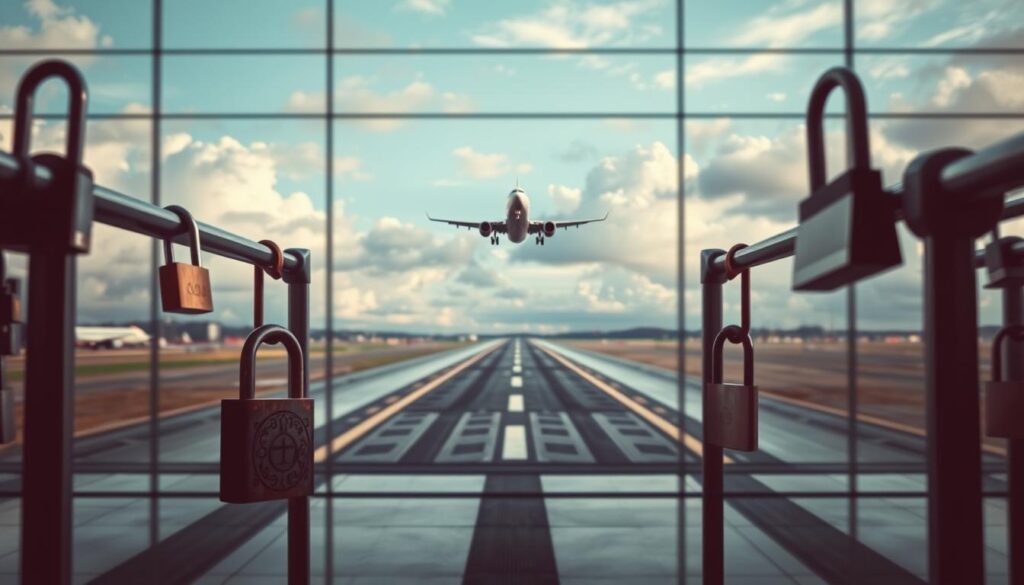
Maximizing Your Travel Experience
Preparing for your upcoming flight can be an exciting yet daunting task. However, with a few strategic considerations, you can enhance your overall travel experience and make the most of your journey. Let’s explore some tips to help you choose your seat wisely and navigate the airport with confidence.
Choosing Your Seat Wisely
When booking your airline tickets, take the time to carefully select your seat. Factors such as leg room, proximity to the aisle, and window or aisle preferences can significantly impact your comfort and convenience during the flight. Utilize online seat selection tools to compare available options and choose the best fit for your needs.
What to Expect at the Airport
Navigating the airport can be a breeze with a bit of preparation. Arrive at the airport with ample time to account for security checks, check-in procedures, and any potential delays. Be familiar with your airline’s policies regarding baggage, carry-on items, and boarding processes. Additionally, consider downloading your airline’s mobile app to stay informed and manage your travel logistics on the go.
- Arrive at the airport with sufficient time to account for security and check-in procedures.
- Familiarize yourself with your airline’s policies regarding baggage, carry-on items, and boarding processes.
- Utilize your airline’s mobile app to stay informed and manage your travel logistics seamlessly.
By following these tips and being proactive in your seat selection and airport navigation, you can enhance your overall travel experience and enjoy a smooth and comfortable journey. Remember, with a little planning, you can maximize the benefits of your airline tickets and make the most of your travels.
Environmental Considerations
As air travel booking and airline tickets become increasingly popular, it’s crucial to consider the environmental impact of air travel. Flights rely heavily on fossil fuels, contributing significantly to carbon emissions and climate change.
The Impact of Air Travel
The aviation industry is responsible for approximately 2.5% of global carbon emissions, with each flight adding to the overall environmental footprint. The burning of jet fuel releases greenhouse gases, which trap heat in the atmosphere and contribute to global warming.
Sustainable Travel Options
For environmentally conscious travelers, there are several sustainable alternatives to consider when planning air travel:
- Choosing direct flights whenever possible to reduce emissions from takeoffs and landings
- Offsetting carbon emissions by supporting carbon-reduction projects
- Opting for high-efficiency airlines that prioritize fuel efficiency and emissions reduction
- Combining air travel with other modes of transportation, such as trains or electric vehicles, to minimize the overall carbon footprint
By making informed choices and prioritizing sustainable air travel options, individuals can play a crucial role in reducing the environmental impact of their trips. Together, we can work towards a more eco-friendly future for air travel booking and airline tickets.
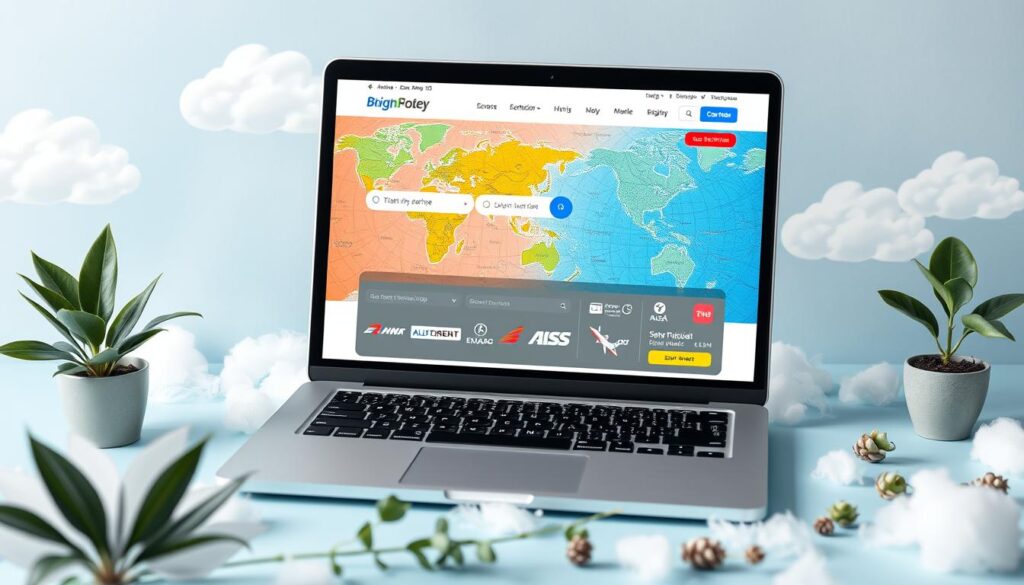
Future Trends in Airline Tickets
As the air travel industry continues to evolve, the landscape of online booking and airline fares is set to undergo significant changes. Advancements in technology and the emergence of new airline business models are shaping the future of air travel ticketing. Let’s explore some of the key trends that are expected to reshape the industry in the years to come.
Technology and Ticket Purchasing
The future of online booking promises a more seamless and personalized experience for travelers. Artificial intelligence and machine learning algorithms will play a crucial role in enhancing the booking process. Travelers can look forward to more accurate and dynamic pricing, personalized flight recommendations, and the ability to easily compare airline fares and availability. Additionally, the integration of mobile apps and voice-activated assistants will make the online booking experience more intuitive and convenient for customers.
Emerging Airline Models
- Subscription-based airlines: Some airlines are experimenting with subscription-based models, offering travelers a fixed number of flights or travel credits for a monthly or annual fee. This model aims to provide more flexibility and predictability for frequent flyers.
- Dynamic pricing: Airline fares will become even more dynamic, with prices fluctuating in real-time based on factors such as demand, seat availability, and even external events. This will require travelers to be more agile in their booking strategies to secure the best deals.
- Sustainable air travel: As environmental concerns grow, airlines are exploring more sustainable options, such as the use of biofuels, electric aircraft, and carbon offset programs. These initiatives will likely impact the pricing and booking process for airline tickets in the future.
By staying informed about these emerging trends in online booking and airline fares, travelers can make more informed decisions and adapt their strategies to find the best deals and enjoy a more seamless air travel experience.
Conclusion: Secure Your Next Flight
As you embark on your journey to find the best airline tickets, remember that patience and diligence are key. By applying the strategies outlined in this comprehensive guide, you’ll be well on your way to securing incredible airfare savings. From mastering airline pricing models to leveraging the power of budget carriers and loyalty programs, the tools at your disposal are plentiful.
Final Tips for Airfare Savings
When it comes to saving on your next flight, remember to remain flexible with your travel dates, explore alternative airports, and take advantage of the wealth of online resources available. The material provided here has equipped you with the knowledge to navigate the complex world of airline tickets and make informed decisions that will keep more of your hard-earned money in your pocket.
Staying Informed on Deals
In the ever-evolving landscape of the airline industry, it’s crucial to stay up-to-date on the latest travel deals and trends. By following trusted travel blogs, subscribing to airline newsletters, and monitoring price comparison websites, you’ll be the first to know about flash sales, limited-time offers, and other opportunities to save on your next flight. With diligence and a keen eye for a good deal, you’ll be well on your way to enjoying exceptional travel experiences without breaking the bank.

